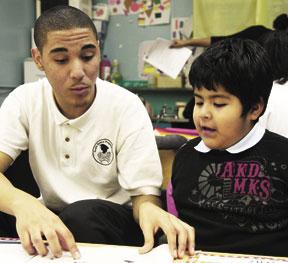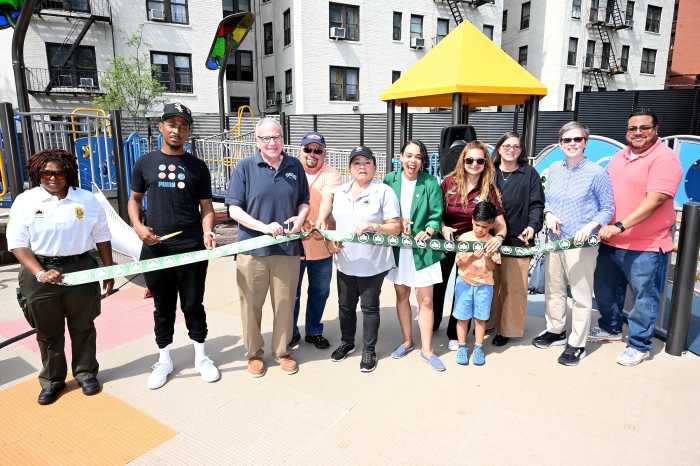Kelly Neault, a teacher at P.S. 179 in Mott Haven, was worried. Well into Elijah’s second year of first grade, he could barely read.
Neault hated watching Elijah struggle. But, with 22 students to instruct, there was only so much she could do.
No wonder Neault beamed when, months later, P.S. 179 promoted Elijah to second grade near the top of his class. On average, READ (Reading Excellence and Discovery) Foundation tutees gain a full grade level. Elijah was no different.
“I felt relieved at his progress,” said Neault, P.S. 179’s 2007-2008 READ program coordinator. “He left the program reading even better than he needed to.”
Some P.S. 179 students enter first grade barely speaking English. Others begin not having attended kindergarten. Enter READ. According to Lavinia Mancuso, the foundation’s development director, it’s better to catch at-risk readers early, before they fall behind.
“Our students leave first grade with a solid foundation,” Mancuso said. “That foundation ensures they remain good readers. We promote a preventative, rather than a remedial, philosophy. And the principals we work with agree.”
Founded in 1999, the READ Foundation pairs teenage reading tutors with first-grade tutees. They read and play games every Tuesday, Wednesday and Thursday after school. READ serves 29 sites, 14 in the Bronx. Verizon sponsors P.S. 179’s program.
“We’ve discovered that first grade is pivotal,” Lauren Sewell-Walker, the school’s assistant principal, said. “And, if a student isn’t learning enough during the day, he or she needs something more intensive.”
Thursday, December 18, three-dozen P.S. 179 students wriggled and giggled, sounding out words. With. What. Which. Their tutors, freshman from South Bronx Preparatory, nodded and laughed, seated awkwardly – knees-to-chest – behind clustered first-grader desks.
“We’ve been lucky with our high schoolers,” Sewell-Walker said. “Once they realize this isn’t a joke, they fall in line.”
READ is first and foremost an organization for young readers. But the teenagers benefit too. They undergo training, pad their resumes and log community service hours. Tutors who volunteer an entire year can apply for READ’s paid summer positions.
“We’re serving two populations,” said Jacki Kelly, another READ staffer. “Our tutors learn how to collect and record data. They master curricula. We prepare them for college and for successful careers.”
Kimberly Scott, 17, remembers slogging through books years ago.
“I like to work with kids,” Scott said. “And when I was little, I had problems with reading. If I’d had this program, maybe I wouldn’t have had to work so hard to catch up.”
Scott, a national honor society member and aspiring sports broadcaster, employs READ’s ‘my word, our word, your word” tutoring system. First she reads, then invites her tutee to read.
“The students are getting smarter,” Scott said. “I’m not proud of myself, I’m proud of the system. It really works.”
When the last bell rings at P.S. 179, the READ tutees split into two groups. One group heads to homework help, the other to tutoring. After 45 minutes, they switch.
Many of the tutor-tutee pairs form meaningful relationships. That’s the aspect of READ that P.S. 179’s principal, Sherry Williams, likes best.
“I love to see the students and their tutors interact,” Williams said. “The students really look up to their tutors – my first grade boys especially.”
Elijah, Neault’s former student, is now a self-assured second grader. Perhaps Princess Davis, 6, will follow in his footsteps.
“I like READ because it helps me learn,” she said shyly. “I like my tutor because she helps me with words.”
























